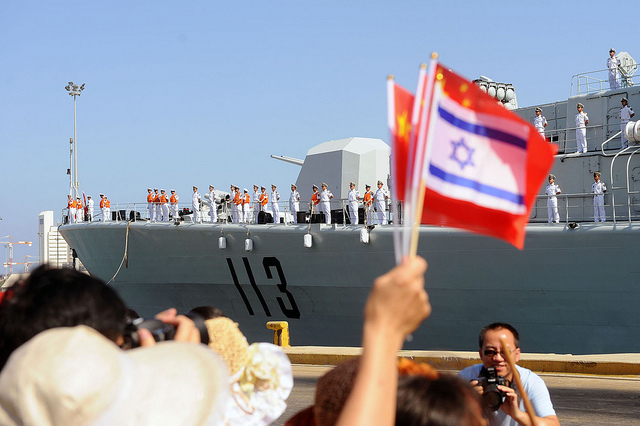Australia/Israel Review
China, Iran dominate Australia/Israel Be’er Sheva dialogue
Nov 29, 2019 | Ahron Shapiro

Against the backdrop of blatant Iranian violations of the 2015 nuclear deal and increasing concern over China’s regional and global ambitions, the fifth annual Be’er Sheva Dialogue was held in Tel Aviv on October 30. The gathering brought together defence officials, senior Australian parliamentarians and top analysts from the Australian Strategic Policy Institute (ASPI), the Begin-Sadat Center for Strategic Studies (BESA) and throughout Israel to discuss areas of strategic common interest and potential collaboration.
ASPI’s delegation included Director of Defence and Strategy Michael Shoebridge, Chairman Lt. Gen. (ret.) Kenneth Gillespie AC, DSC, CSM, and Jack Norton, editor of The Strategist, while BESA participants included Director Professor Efraim Karsh, senior research associate Professor Eytan Gilboa and Maj. Gen. (Res.) Gershon Hacohen.
As in previous years, current and former Australian lawmakers also joined the dialogue, including Andrew Hastie, the Liberal Member for Canning and the chair of the Parliamentary Joint Committee on Intelligence and Security, and former Labor Member for Canberra Gai Brodtmann, who served as shadow assistant Minister for Cyber Security and Defence Personnel in the last parliament.
The location of this year’s conference made possible the inclusion of a wealth of top Israel-based defence analysts and experts in the dialogue, including Brig. Gen. (Res.) Yossi Kuperwasser, Director of the Project on Regional Middle East Developments at the Jerusalem Center for Public Affairs; Maj. Gen. (Res.) Amos Gilad of IDC Herzliya; nuclear non-proliferation expert Dr. Emily Landau of Tel Aviv University’s security think tank INSS; and author and journalist Yossi Melman.
Topics ranged from regional perspectives on national security to international challenges through to harnessing technology for national security. However, perhaps the day’s highlights could be found in the sessions which grappled with how to deal with Iran in light of its violations of the 2015 nuclear deal, as well as the thorny issue of China’s use of soft power to gain influence in both Australia and Israel.
An Australian participant saw parallels in the two issues in terms of Australian national interest.
“Australia’s national interests mean we do support international law and peaceful settlement of disputes, and we’re working to find ways to prevent empowered authoritarian states, in the body of China, using its proxies and grey zone activities to achieve aims in our own region. And we see parallels with the need to also oppose the authoritarian theocratic regime that is Iran acting in similar ways and in some different ways here in the Middle East,” the participant said.
On the issue of Iran, an Israeli participant argued three key points: First, contrary to popular belief, Iran was violating the nuclear deal before US President Donald Trump withdrew from the deal in order to pressure Iran to renegotiate. Secondly, the perception that Trump’s pressure on Iran to renegotiate the deal is a failure is premature, because it’s a process that is still ongoing. Finally, the participant argued that placating Iran is not going to be effective in future negotiations.
“This negotiation was all about getting an NPT violator back to the fold,” the participant said.
“These are not two equal parties that have an equal responsibility to make concessions… So pressure and force are inherent to this process. And whether you deal with Iran through negotiations or by means of military force, an element of force will be there because Iran does not want to give up its nuclear weapons option, and to get it there, you’re going to have to be forceful with Iran.”
As the Be’er Sheva Dialogue convened in Tel Aviv, Israel’s security cabinet was meeting in Jerusalem, where they authorised the formation of a government committee to monitor foreign investments – a move that may be tacitly aimed at curbing Chinese influence. The breaking development added to the timeliness of the Dialogue’s session on China.
Indeed, an Israeli expert at the conference raised concern about China’s US $25 billion (A$37 billion) investments in Israeli business and infrastructure. “The Chinese are actively working in Israel with soft power [primarily in] technology and high-tech,” the expert said.
Besides worries over an Israeli deal with the Chinese company Shanghai International Port Group (SIPG) – a company in which the Chinese government has a majority stake – to manage Israel’s Haifa port beginning in 2021, an Israeli expert expressed concern over Chinese infrastructure contracts, such as the Tel Aviv subway.
“Its route is 200 metres from the IDF headquarters, from the military intelligence headquarters and from the Ministry of Defence,” an expert noted.
“It’s not only that they are digging the tunnels,” he added, “They’re also providing the trains, and God knows what they’ll put in the trains.”
Following the conclusion of the last session, participants were given an opportunity to suggest new ideas and directions to guide planning for future Dialogues.
As in previous years, AIJAC participated in and helped facilitate the event, as well as arranging additional security briefings for the Australian delegation before and after the conference itself.
On Oct. 28, AIJAC led a full-day survey of the Golan Heights and Israel’s northern border for Dialogue participants, guided by Israeli military intelligence Lieutenant Colonel (Res.) Sarit Zehavi. On Oct. 31, the group was briefed along the Gaza border by a representative of the Sderot Media Centre.
The Be’er Sheva Dialogue is made possible in part through the generosity of the Pratt Foundation, whose CEO Sam Lipski was also in attendance.






